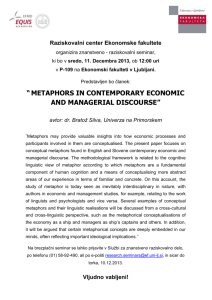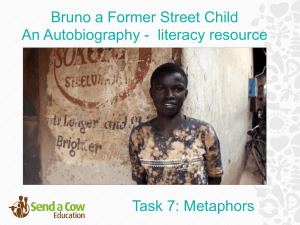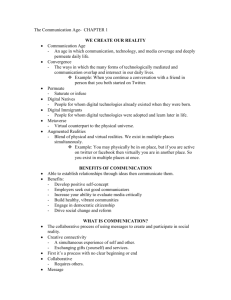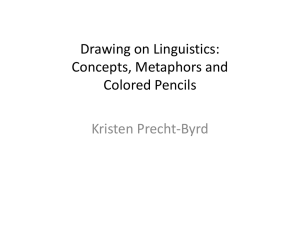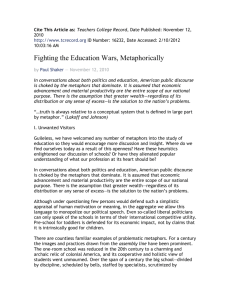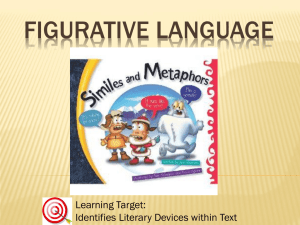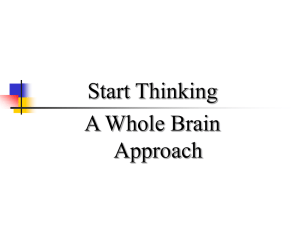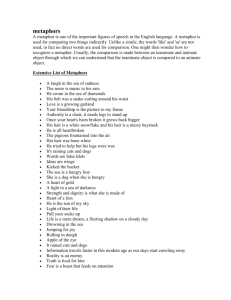Building, tunnelling and waiting: mature students `speaking
advertisement
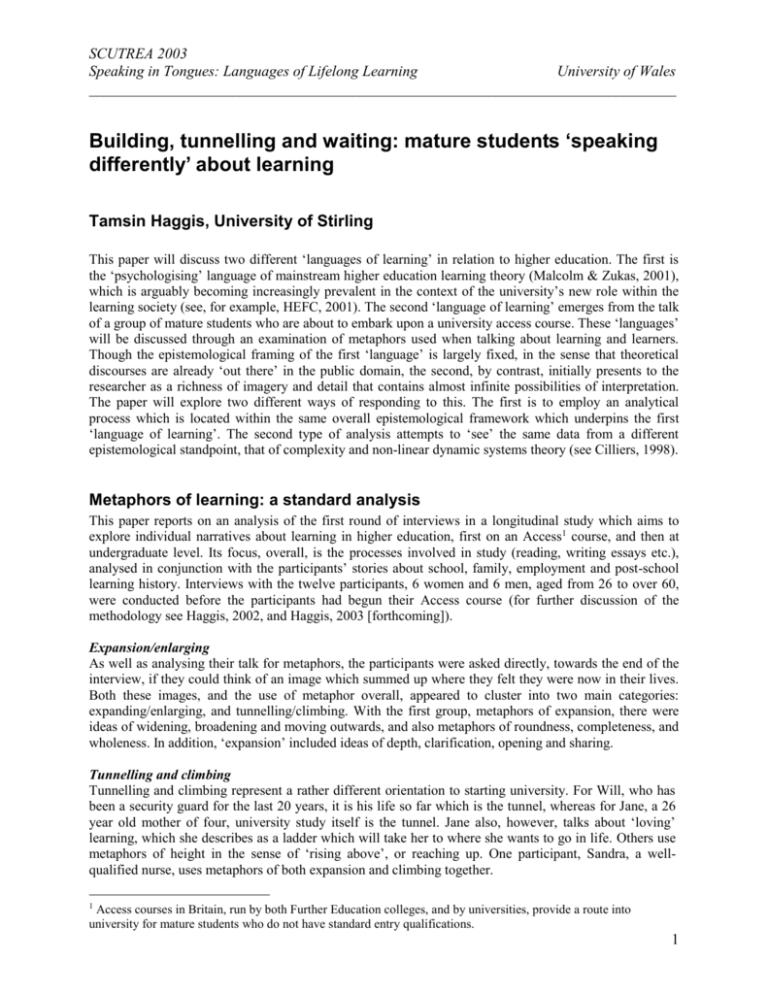
SCUTREA 2003 Speaking in Tongues: Languages of Lifelong Learning University of Wales ______________________________________________________________________________ Building, tunnelling and waiting: mature students ‘speaking differently’ about learning Tamsin Haggis, University of Stirling This paper will discuss two different ‘languages of learning’ in relation to higher education. The first is the ‘psychologising’ language of mainstream higher education learning theory (Malcolm & Zukas, 2001), which is arguably becoming increasingly prevalent in the context of the university’s new role within the learning society (see, for example, HEFC, 2001). The second ‘language of learning’ emerges from the talk of a group of mature students who are about to embark upon a university access course. These ‘languages’ will be discussed through an examination of metaphors used when talking about learning and learners. Though the epistemological framing of the first ‘language’ is largely fixed, in the sense that theoretical discourses are already ‘out there’ in the public domain, the second, by contrast, initially presents to the researcher as a richness of imagery and detail that contains almost infinite possibilities of interpretation. The paper will explore two different ways of responding to this. The first is to employ an analytical process which is located within the same overall epistemological framework which underpins the first ‘language of learning’. The second type of analysis attempts to ‘see’ the same data from a different epistemological standpoint, that of complexity and non-linear dynamic systems theory (see Cilliers, 1998). Metaphors of learning: a standard analysis This paper reports on an analysis of the first round of interviews in a longitudinal study which aims to explore individual narratives about learning in higher education, first on an Access1 course, and then at undergraduate level. Its focus, overall, is the processes involved in study (reading, writing essays etc.), analysed in conjunction with the participants’ stories about school, family, employment and post-school learning history. Interviews with the twelve participants, 6 women and 6 men, aged from 26 to over 60, were conducted before the participants had begun their Access course (for further discussion of the methodology see Haggis, 2002, and Haggis, 2003 [forthcoming]). Expansion/enlarging As well as analysing their talk for metaphors, the participants were asked directly, towards the end of the interview, if they could think of an image which summed up where they felt they were now in their lives. Both these images, and the use of metaphor overall, appeared to cluster into two main categories: expanding/enlarging, and tunnelling/climbing. With the first group, metaphors of expansion, there were ideas of widening, broadening and moving outwards, and also metaphors of roundness, completeness, and wholeness. In addition, ‘expansion’ included ideas of depth, clarification, opening and sharing. Tunnelling and climbing Tunnelling and climbing represent a rather different orientation to starting university. For Will, who has been a security guard for the last 20 years, it is his life so far which is the tunnel, whereas for Jane, a 26 year old mother of four, university study itself is the tunnel. Jane also, however, talks about ‘loving’ learning, which she describes as a ladder which will take her to where she wants to go in life. Others use metaphors of height in the sense of ‘rising above’, or reaching up. One participant, Sandra, a wellqualified nurse, uses metaphors of both expansion and climbing together. 1 Access courses in Britain, run by both Further Education colleges, and by universities, provide a route into university for mature students who do not have standard entry qualifications. 1 SCUTREA 2003 Speaking in Tongues: Languages of Lifelong Learning University of Wales ______________________________________________________________________________ Comparing metaphors When the participants metaphors of learning are compared to those of the ‘official discourse’ (Lillis, 2001) of mainstream higher education learning theory2 a number of differences emerge3. The first is the difference between deep in the official discourse as individual, specialist knowledge, whilst in the participant discourses deep is related to ideas of expansion and growth in a multi-directional sense, connected to ideas of breadth and widening, as well as sharing and relationship with others. The second area of difference is in the idea of progression upwards, or height. In the mainstream discourse, the student moves upwards in a straightforward, linear way towards a clearly defined cognitive goal (students who do not do this exhibit ‘pathologies’ or ‘dissonance’, leading to ‘shallow’ outcomes). In the participant discourse, movement is over, upwards and through, in the sense of battling against obstructions (social, relational, personal), and is directed towards brightness, light, new atmospheres, and new spaces for the imagination. The third contrast is the difference between learning as something of the mind, in the first case, compared to learning as something involving a totality of mind, body and being, in a philosophical and ontological sense, for the participants. Finally, there is the contrast between the overall metaphors of moulding and producing, in relation to institutional agendas, compared to ideas of expanding, clarifying, mapping, tunnelling and climbing in relation to personal agendas. Learning in the first sense is constructed as a means for achieving institutional outcomes, whilst in the second, it appears to be a tool for the creation of new identities and selves. ‘Thinking differently ‘ about metaphors of learning Metaphors… are not idle flourishes. They shape what we do (Hudson, in Taylor, 1984:72) This exploration of metaphor has arguably begun to surface aspects of these different constructions of learning that are not necessarily easy to see using other forms of analysis. In addition, the analysis suggests that the institutional orientation towards learning, and the values associated with such learning, may differ significantly from the orientations and values of some mature, ‘lifelong’ learners. The future of this longitudinal study may offer some suggestions about how this difference might impact upon these learners’ educational trajectories. One area of particular interest is the idea of ‘fit’ between learners’ orientations and those of the institution. Will those whose orientation is characterised by ideas of ‘expansion’, which appear to have some links to the top levels of the ‘conceptions of learning’ model in the official discourse 4, be more successful than those who express ideas of tunnelling and struggle, which institutional models do not acknowledge? And will the subject specialisation of disciplinary learning provide the broadening and opening of personal horizons that is hoped for, or will the narrowness of such knowledge-based specialization lead perhaps to alienation, or disappointment? Discussion of the implications of this analysis beyond these questions, however, is potentially problematic. It could be argued that learner discourses are bound to be different from theoretical discourses, because they have been generated in different ways, for different purposes. From this perspective, the ‘official’ picture of learning is a general abstraction, which should be used as a heuristic, rather than seen as a description of reality. The second picture, in this view, has been created from the accounts of a small group of individuals, and, as such, is problematic because it has limited applicability 2 This refers to the work that has developed around the ideas of deep and surface approaches to learning, and conceptions of learning (eg. Marton & Saljo, 1984/1997; Prosser et. al. 2003) 3 More detail is contained in the handout distributed at the presentation 4 The top layers of the ‘conceptions of learning’ model include learning as ‘the abstraction of meaning’, ‘an interpretive process aimed at understanding reality’, and ‘developing as a person’ (Marton & Saljo, 1984/1997) 2 SCUTREA 2003 Speaking in Tongues: Languages of Lifelong Learning University of Wales ______________________________________________________________________________ to other situations. What, those that argue in this way might ask, can the significance be of an analysis that relates to such a small sample of new learners in higher education? This familiar question exhibits underpinning epistemological assumptions which reflect conceptions of scientific rigour, and habits of scientific analysis, which are so taken for granted that they are rarely commented upon. In order to create a theme or category, it is usually accepted that a piece of the data has to be removed from the context in which it was originally expressed: to create a category such as ‘metaphors of enlargement and expansion’, for example, the metaphors have to be taken out of the narrative context within which they were originally located. This process of de-contextualisation, necessary in order to find themes in common, across different accounts, however, is arguably not really consistent with contemporary awareness of the context-specific nature of phenomena, of the locatedness of things. In addition, theming and categorising are about creating patterns of sameness, which obscure and silence the ways in which things are different. Newer approaches to the study of learning, such as those based in theories such as social constructivism, situated learning, and some recent theoretical perspectives in adult education, further education and higher education, however, express a concern with difference (as opposed to commonality), specificity (as opposed to generalisability), and the effects of context (as opposed to abstraction). The epistemology which underpins much research into learning does not seem to be congruent with these concerns. The deterministic and probabilistic assumptions which underpin many current constructions of educational research, however, are based on only one conception of science. There are other equally scientific epistemologies, such as those that underpin relativity, quantum, chaos and complexity theory. These types of theorising are underpinned by non-determinist assumptions, which result in descriptions of fundamentally non-linear processes and patterns in phenomena. These epistemologies have potential implications which are only just beginning to be explored in educational research. Complexity theory (Cilliers, 1998; Byrne, 1998), for example, points to the importance of local interactions, and to the interconnectedness of different elements in a local situation. This could be seen as focusing attention on the existence of many elements within individual contexts of learning which processes of abstraction and generalisation are forced to modify, in order to fit them into a category, or indeed, if they won’t fit, to completely ignore. It also allows for recognition of a multiplicity of connections between elements, connections which have to be severed in theming and categorisation processes. From the perspective of theories of complexity and emergence, local elements constantly interact, and, through feedback, change and re-form each other in a continuing, non-linear, and unpredictable ways. This leads to the powerful and somewhat disturbing suggestion that meaningful order may be created by emergent processes that are fundamentally unpredictable, and/or untrackable. In terms of the data being discussed here, it might be asked how the stories of the participants in this study would look if, instead of focussing upon creating themes out of groups of de-contextualised elements, different local elements of each story were looked at together, without necessarily any intention to try to articulate the precise nature of the relationships between these different elements. Investigating difference in specific contexts When the participants’ use of metaphor is examined in relation to the different elements of each individual’s story, there are two things which emerge in comparison to the analysis which underpins the first part of this paper. The first is that the categories which can be created in a cross-sectional analysis (eg. metaphors of expansion or tunnelling) can no longer be sustained as discrete entities. In this second analysis, boundaries between categories refuse to be neatly drawn; categories mix and interweave, and constitute each other in ways that can only ‘make sense’ in terms of the context within which the story is being told. Furthermore, the elements of the data which had been clustered together, suggesting the existence of a group of like phenomena (eg. ‘expansion’), begin to uncouple themselves into kaleidoscopic pictures of difference at the level of individual, contextualised constructions of meaning. Freed from the 3 SCUTREA 2003 Speaking in Tongues: Languages of Lifelong Learning University of Wales ______________________________________________________________________________ constraints of cross-sectional categorisation, however, patterns of meaning, so hard to sustain across different accounts, begin to emerge within accounts in quite clearly defined ways. It is only possible here to give one brief example of this (for further examples, which more clearly illustrate the idea of difference, see Haggis, 2003). Sandra Sandra(30s), who has negative memories of school, expresses these as frustration that her mother made her help with her catering business every day, rather than encouraging her to do school work. She suspects that her mother was jealous of her opportunities, after getting pregnant with Sandra when she was 16. Since school, Sandra, as a nurse, has done a whole range of professional courses, and is thus ‘successful’ in educational terms. But this is not how she talks her about her life. She is frustrated and desperate for change. Multiple things seem to have come together to make university seem important, and possible, now: a change of circumstances in returning from abroad to find unsatisfactory work, divorce, her child now at the age that it is possible to arrange childcare. In addition her sense of irritation with those she deems apathetic at work seems to have reached an intolerable level: Five years ago I got a sense of learning being important, exciting. My husband loved his work, he used to get up at 4.00 am to study and enjoyed it. I’ve never felt that way. … I want to know the big picture… people who are educated want to do their work, it comes across. I’ve seen that, in you, in other students, in my husband. Other people are just doing a job, complaining all the time… Sandra talks about feeling up until now that she has never reached ‘what she’s supposed to be’. However, having got ‘over the hurdle’ of feeling ‘small and insignificant’ on her first day in the university (she nearly turned round and went home again), she now has clear, and strong, feelings about her current situation: I can feel it, this is the right place for me to be. It’s a new feeling, bigger than getting married….. I’ve crossed the fence. I was always on the other side of the fence looking over. Like you’re an outsider….and now I’ve crossed that fence. I’m still at the bottom of the field, …but, I’m over the fence. What was the fence? Just barriers, a lot of barriers, that you just go up against all the time, just in life, everything. And you just knew that there’s more, and you’re able to do more…but you were always just held back. Whether its family, work, anything…. What do you see now that you’re on the other side of the fence? Eh… a lot of struggles, a lot of falling down…..Yeah, I’m not in that house yet, and I’ve got a long way to go to get there. So there’s a house. At the top of the field there’s a house…. And once I reach that house. ..I’ll feel…complete. 4 SCUTREA 2003 Speaking in Tongues: Languages of Lifelong Learning University of Wales ______________________________________________________________________________ Sandra uses images of ‘completeness’, as well as those of depth, height, hurdles and barriers. These different ideas are entwined together in complex ways. Apart from her own search for a kind of wholeness, for example, she talks about university learning as being both ‘at a different level’ and also ‘more complete’. She talks of learning becoming more enjoyable ‘the further down you go’, and of her previous teachers teaching ‘at a surface level’, where no-one answered her questions. Despite her expressed lack of satisfaction with the formal learning she has done so far, however, her past engagement in professional courses nonetheless seems to have involved more than simply an ‘instrumental’ desire for professional advancement. She did extra courses because she wanted to know ‘the round picture…from all directions’ of her subject (she contrasts round with surface), so that she could ‘help people as best as possible’. Sandra’s view of learning at this stage is highly complex, involving existential, instrumental, intellectual and emotional desires which have coalesced at this point in her life into a sense of absolute clarity and determination. Her very personal, philosophical agenda, however (which seems to be characterised by wanting more, of just about everything), is not only about herself, but incorporates relational and social desires. The picture of ‘learning in a context’ which begins to emerge from focusing on Sandra’s use of metaphor cannot easily be compared with the equally complex stories of the other participants (see Haggis, 2003). Such a picture, however, cannot be described as random, and certainly not as meaningless. It is meaningful complexity which emerges, and furthermore which emerges differently, in each case. Each person, creating and expressing their own sense of self and place in the context of the interview, appears, when their story is analysed in this way, to be an ‘exception’ to the kinds of rules which might be created by other kinds of analytical approach. This paper has used two types of analysis to explore metaphors in talk about learning in higher education. The focus on metaphor in the more conventional analysis raises a number of questions about the differences, and the similarities, between learner discourses and the official discourses of mainstream higher education learning theory. The discrepancies, in particular, raise questions about the ‘fit’ between institutional understandings of learning, and those of some ‘lifelong learners’, who may be engaging with higher education learning for quite a different set of reasons and purposes to that identified by the institution. Examining metaphors in the context of individual lives, the second type of analysis, presents an account of learning that is characterised by difference, in contrast to the similarity groupings which emerged from the first analysis. It is suggested that this difference in metaphor and story, however, is not random or ‘idiosyncratic’ at the level of the individual. Seen in relation to other elements of each participant’s story, the use of metaphor is part of a patterning in each case which appears to articulate something of the meaning of learning in higher education for each participant. It is hoped that further work using this type of ‘non-determinist’ approach to the analysis of interview data might be able to begin to articulate a conceptual framework which, whilst still operating from an epistemological base as ‘scientific’ as the currently dominant deterministic model, could make it possible to begin to ‘talk differently’ about issues such as meaning and identity in relation to lifelong learning. References Biggs, J. (1999) Teaching for Quality Learning at University Buckingham, Open University Press Byrne, D. (1998) Complexity Theory and the Social Sciences London, Routledge Cilliers, P. (1998) Complexity and Post-modernism London, Routledge Haggis, T. (forthcoming) Meaning, Identity, and ‘Motivation’: expanding what matters in understanding learning in higher education? Studies in Higher Education Haggis, T. (2003) Constructions of learning in higher education: metaphor, epistemology, and complexity Paper presented at Discourse, Power, Resistance Conference Plymouth, April 2003 5 SCUTREA 2003 Speaking in Tongues: Languages of Lifelong Learning University of Wales ______________________________________________________________________________ Haggis, T. (2002) The desire to alter the state you’re in: learning, meaning and identity at the point of transition into higher education, 32nd Annual SCUTREA conference, Stirling, July 2002 Higher Education Funding Council (hefc) (2001) 01/37 Strategies for learning and teaching in higher education (Bristol, Higher Education Funding Council for England). Hudson, L. (1984) Metaphors in Psychological Research in Taylor, W. (Ed) Metaphors of Education London, Heinemann Lillis, T. (2001) Student Writing London, Routledge Malcolm, J. & Zukas, M. (2001) Bridging pedagogic gaps: conceptual discontinuities in higher education, Teaching in Higher Education, 6, pp. 33 – 42. Marton, F. & Saljo, R. (1984/1997) Approaches to learning in The Experience of Learning Edinburgh, Scottish Academic Press Prosser, M. Ramsden, P. Trigwell, K, Martin, E. (2003) Dissonance in Experience of Teaching and its Relation to the Quality of Student Learning Studies in Higher Education 28, 1. pp. 37 - 48 Rowland, S. (1993) The Enquiring Tutor: Exploring the Process of Learning London, Falmer Press 6
